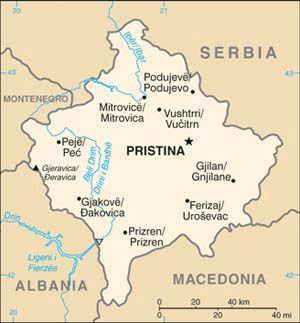Kosovo: Yet More Barricades In Sight – Analysis
By Fatmir Aliu
Kosovo’s nationalist opposition have announced that they may erect some road blockades of their own in the first weeks of 2012.
In northern, Serb-run Kosovo roads have been blocked for several months now by local Serbs protesting over the presence of Kosovo government police and customs on the contested border with Serbia.
The opposition Vetevendosje [Self-Determination] movement now says it may start blocking vehicles coming from Serbia at the northeast Merdare border crossing and on the southeast Dheu i Bardhe border.
The potential blockades will be aimed at upholding a recent parliamentary motion advocating a trade ban with Serbia.
Shpend Ahmeti, vice-president of Vetevendosje, said it is the fault of the government’s failure to deal with deal with a range of serious problems.
These vary from growing poverty and unemployment to the continued existence of Serb-run so-called “parallel structures” in the north of the country.
EU and US unwillingness to resolve the problem of the breakaway Serb-run north leaves little hope of change, he adds.
“The financial crisis in the EU leaves Kosovo in a very unstable position and facing an unpredictable path in 2012,” Ahmeti continues.
“The year 2012 is going to be crucial for Kosovo and it could go both ways, good or bad,” he maintains.
“It can go terribly wrong if the current government continues to rule, the economy worsens and the north goes in the wrong direction.. at the same time it could be a good time for new elections,” he suggests.
Kosovo’s parliament adopted a motion in December calling on the government to re-introduce a trade ban with Serbia.
The Vetevendosje-sponsored motion urged the government to “undertake full political, economical and trade measures” against Serbia.

But Hashim Thaci’s government has since downplayed the motion and called it an opinion of parliament rather than an order.
In fact Thaci’s government did impose trade sanctions on Serbia on July 20 but then removed them on September 2 once the two sides had reached an agreement on Kosovo custom stamps.
In theory the deal allows Kosovo to export goods to Serbia for the first time since it declared independence in February 2008.
Northern Serbs, meanwhile, have erected dozens of barricades since July 25, blocking roads in reaction to a government police operation aimed at seizing border crossings in the north with Serbia.
Corruption
Problems in the north are not the only issue facing the government in 2012.
The country enters the year with an approved budget that is 7.7 per cent larger than that of 2011, costed at €1.5 billion with revenues estimated at €1.36 billion. The deficit is equivalent to about 3 per cent of GDP.
Limited progress on fighting organized crime, corruption, drug trafficking, and money laundering are other major challenges in the months to come.
Kosovo’s anti-corruption agency says the authorities continue to remain largely unaccountable for the taxpayers’ money that they spend, as there is still little transparency in the field of public procurement.
The Anti-Corruption Agency director, Hasan Preteni, says many public officials fail to set a good example when it comes to transparency.
“Every fifth of the 1,860 forms that we have processed concerning the origin of politicians’ wealth, compared to the revenues they have declared, do not match,” he noted.
He noted also the continuing lack of tough anti-corruption legislation empowering police to confiscate property and assets whose origins cannot be verified.
The state of the courts in general continues to be troubling. There are around 150,000 unresolved or pending cases before Kosovo’s Courts.
The European Union is expected to help address the weak state of the rule of law in the country and has proposed a structured dialogue with the authorities concerning support for the judiciary.
This weakness, according to Hasan Preteni, is reflected in slow progress in the fight against corruption.
“We need to press further the issue and do the homework as there’s no more time to lose,” he said.
“Look at our neighbours, all of whom have now achieved visa liberalization with the EU. Our judiciary needs to wake up and match the anti-corruption fight with concrete results.”
Visa liberalization
The government is fully aware of the need to press for visa liberalization with the EU so that citizens of Kosovo can travel to Europe for business or tourist purposes without needing to apply for visas.
In 2012 Kosovo hopes to open dialogue with the European Commission on the country’s entry into the passport-free Schengen zone of the EU.
Kosovo was left isolated in the region after Europe scrapped visa requirements for citizens of Serbia, Macedonia and Montenegro in December 2009 and then for Bosnia and Herzegovina and Albania in 2010.
